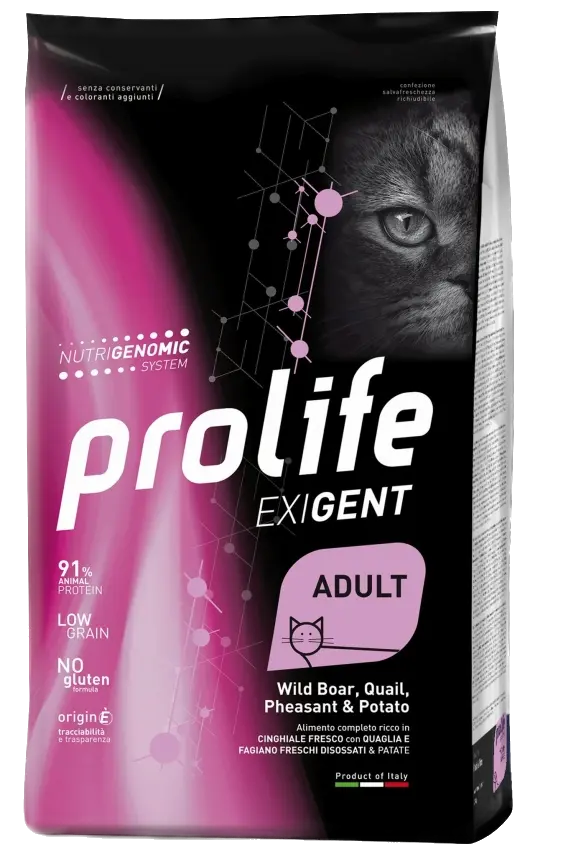Prolife
Exigent - Adult Wild Boar, Quail, Pheasant & Potato
Adult
Regular
Indoor and Outdoor
Click to reveal the score breakdown
Tap to view ingredients, guaranteed analysis and more
Product Summary
Prolife Exigent Adult Wild Boar, Quail, Pheasant & Potato is specifically tailored for finicky adult cats, using fresh wild boar, quail, and pheasant as the main protein sources to support muscle health. With added chicory inulin for gut health and omega-6 fatty acids for skin and coat vitality, it also includes the Alltech® Nutrigenomic System for overall wellness.
Pros:
- Features 38% protein from wild boar, quail, and pheasant for robust muscle maintenance.
- Omega-6 fatty acids at 3.2% aid in coat health, and balanced minerals support urinary health.
- Chicory inulin promotes digestive well-being.
Cons:
- High-fat content at 20% may not be ideal for sedentary cats.
- It contains 8.4% ash, potentially affecting urinary health.
- Carbohydrates from potatoes and rice may not suit all cats.
Ingredients
Fresh boneless wild boar
20%
Dehydrated chicken
Potatoes
13%
Fresh boneless quail
10%
Fresh boneless pheasant
10%
Rice
9%
Dehydrated pork
Chicken fat
Hydrolyzed animal proteins
Alltech® Nutrigenomic System Cats
1.2%
and also:
Arbocel® Cellulose (1%), Minerals, Chicory Inulin (source of FOS, 0.1%) (0.1%)
Vitamins and Additives
Vitamin A 33000 IU
Vitamin B1 10 mg
Vitamin B2 0.15 mg
Vitamin B6 6 mg
Vitamin B12 0.15 mg
Vitamin C 53.8 mg
Vitamin D3 1500 IU
Vitamin E 500 mg
Vitamin K3 1 mg
and also:
Folic acid (3a316) 1 mg, Calcium D-pantothenate (3a841) 16 mg, Biotin (3a880) 0.5 mg, Niacin (3a314) 50 mg, Choline chloride (3a890) 2,765 mg, Taurine (3a370) 230 mg, Vitamin C (3a300) 3.84 mg, Iodine 1.5 mg (Calcium iodate anhydrous in coated granules (3b203) 2.31 mg), Copper 2.04 mg (Copper (II) chelate of protein hydrolysates (3b407) 20.4 mg), Manganese 2.52 mg (Manganese chelate of protein hydrolysates (3b505) 25.2 mg), Zinc 25.6 mg (Zinc chelate of protein hydrolysates (3b612) 586.2 mg), Selenium 0.12 mg (Organic form of selenium produced by Saccharomyces Cerevisiae CNCM I-3060 (3b8.10) 54.6 mg).
Notes
The score is calculated after relocation of fresh meat or fish ingredient(s) as explained in the calculation rule #7 in Chapter 1.
Guaranteed Analysis
Crude Protein
38%
Crude Fat
20%
Crude Fiber
2.1%
Crude Ash
8.4%
Calcium
1.1%
Phosphorus
0.85%
Potassium
0.6%
Magnesium
0.1%
Omega 3
0.23%
Omega 6
3.2%
Metabolizable Energy
4090 kcal/kg
Notes
The score is calculated after relocation of fresh meat or fish ingredient(s) as explained in the calculation rule #7 in Chapter 1.
Product last updated: October 7, 2024, 10:36 PM
Please hold on while we’re getting the best offers for you
7005
















